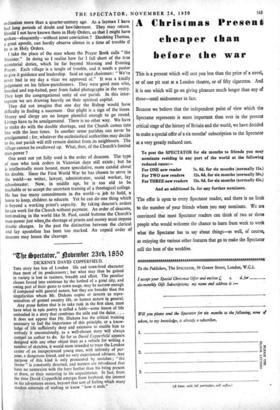"Mbeil)pectator," Aobetnber 23rb, 1850
DICKENS'S DAVID COPPERFIELD.
Tins story has less of London life and town-bred character than most of its predecessors ; but what may thus be gained in variety is lost in raciness, breadth and effect. The peculiar classes forced into existence by the hotbed of a great city, and owing part of their gusto to town usage, may be narrow enough if compared with general nature, but they are broader than the singularities whom Mr. Dickens copies or invents as repre- sentatives of genteel country life, or human nature in general.
Any prose fiction that is to take rank in the first class, must have what in epic poetry is called a fable—some lesson of life embodied in a story that combines the utile and the dulce. . It does not appear that Mr. Dickens has the critical training necessary to feel the importance of this principle, or a know- ledge of life sufficiently deep and extensive to enable him to embody it unconsciously, as a well-chosen story will always compel an author to do. So far as David Copperfield appears designed with any other object than as a vehicle for writing a number of sketches, it would seem intended to trace the London career of an inexperienced young man, with infirmity of pur- pose, a dangerous friend, and no very experienced advisers. Any purpose of this kind is only prosecuted by snatches ; "the theme" is constantly deserted, and matters are introduced that have no connexion with the hero further than his being present at them, or their occurring to his acquaintance. In fact, from the time David Copperfield emerges from boyhood, the interest in his adventures ceases, beyoncl that sort of feeling which many readers entertain of wishing to know "how it ends."














































































 Previous page
Previous page